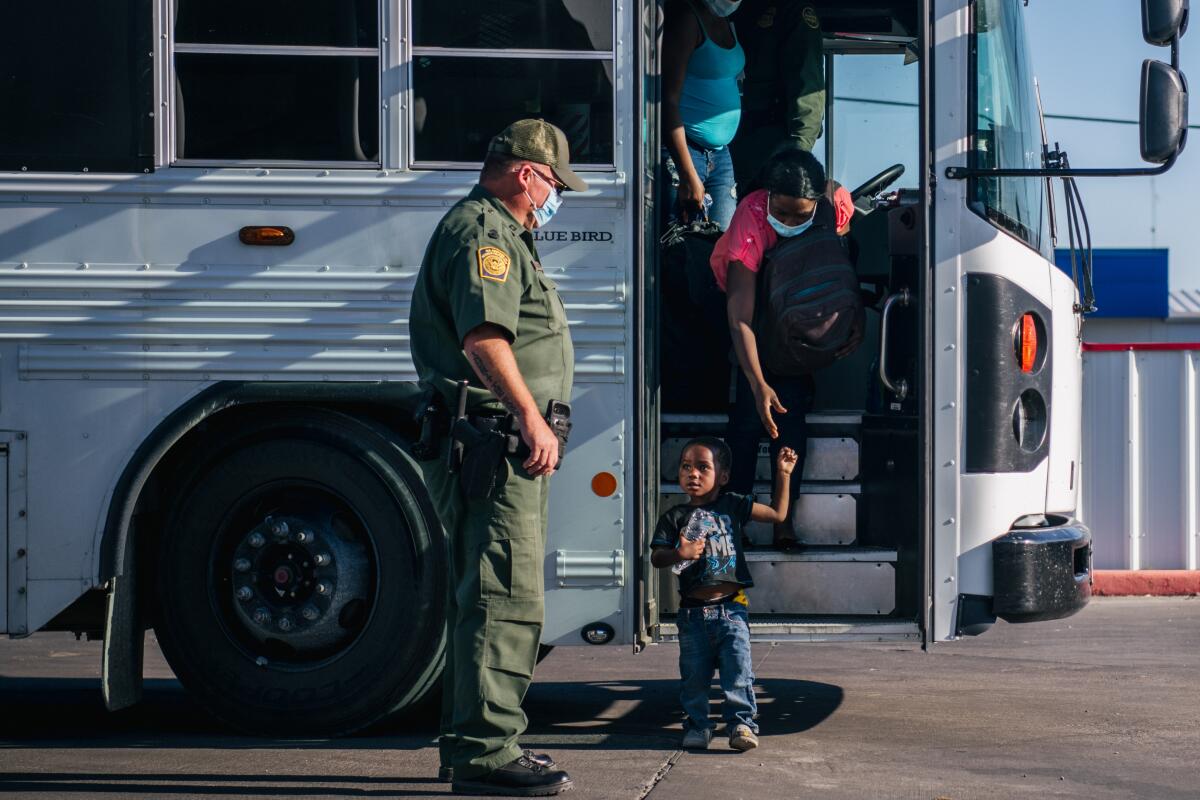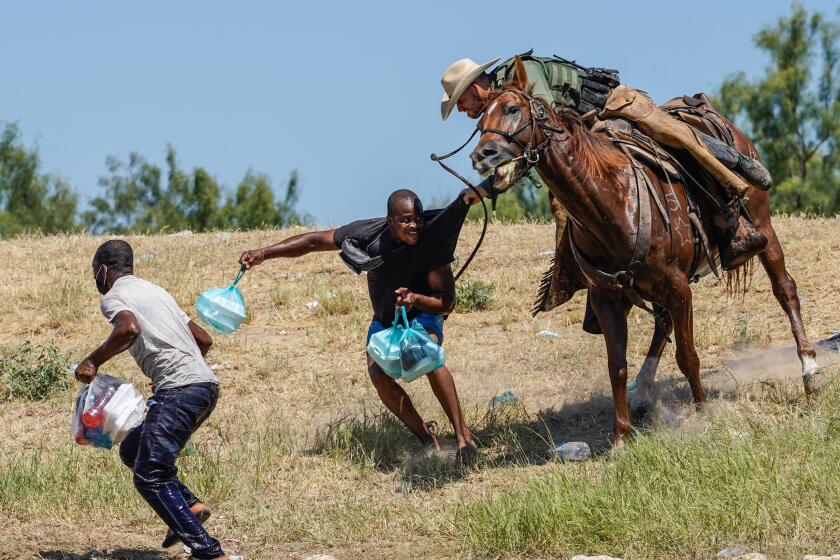Biden calls Haitian migrant crisis âan embarrassment.â Advocates say racism at root

DEL RIO, Texas â Facing mounting political pressure from all sides over his handling of the border, President Biden on Friday said the treatment of Haitian migrants this week was âbeyond an embarrassmentâ and âdangerous.â
Biden promised consequences after an investigation into how Border Patrol agents on horseback confronted Haitian migrants, some appearing to swing their reins like whips. Officials later suspended the use of horse patrols near the camp.
âIt sends the wrong message around the world,â Biden said. âItâs simply not who we are.â
Throughout history, waves of would-be refugees â Irish in the 1800s, Iraqis after the Sept. 11 attacks, Mexicans and Central Americans for decades â have encountered both hostile and welcome receptions upon setting foot in the United States.
But few groups have endured a less enthusiastic reception than Haitians, despite the pivotal role that the United States has often played in spurring people of the impoverished Caribbean nation to jump ship in the first place, say academic experts, activists and Haitian American community members.
Advocates say those arriving now deserve more consideration.
The two are trying to distance themselves from the administrationâs handling of the U.S.-Mexico border crisis, particularly the treatment of Haitian migrants.
Marleine Bastien, a longtime Haitian community activist and executive director of the Family Action Network Movement in Miami, maintains that racism and 50 years of failed U.S. foreign policy are at the root of the countryâs humanitarian crisis.
âItâs U.S. foreign policies vis-Ă -vis Haiti that prioritize dictators, autocrats and corrupt leaders â some of them singlehandedly picked by the U.S. and ignoring the plight of the Haitian people,â she said. âAs long as we continue failed policies, we will see this kind of tragedy and crisis at the southern border.â
That crisis exploded this week as images of horseback-mounted Border Patrol agents chasing down desperate Haitians flashed across the world, causing both adversaries and allies of the Biden administration to condemn the treatment of innocent men, women and children fleeing an earthquake-ravaged, politically unstable country in hopes of starting over.
A makeshift camp on the banks of the Rio Grande, once filled with 15,000 mostly Haitian migrants, had emptied by Friday morning. Homeland Security Department officials said that about two-thirds had arrived in family groups.
More than 2,000 migrants have been returned to Haiti on 17 flights since Sunday. About 12,400 people released into the U.S. were placed in deportation proceedings and will have their cases heard by an immigration judge, DHS Secretary Alejandro Mayorkas said during a White House news briefing. Another 5,000 migrants were being processed by DHS, he said.
An estimated 8,000 migrants abandoned the Del Rio camp and returned to Mexico, Mayorkas said. Despite the increase in Haitians at the southern U.S. border, they represent a small share of overall border encounters. Last month, they made up an estimated 4% of Border Patrol encounters.
Biden says an investigation is underway into how Border Patrol officers on horseback dealt with Haitian immigrants.
Steven Cesar, 29, was hoping to join cousins in Miami and Orlando and find work to support his 8 year-old daughter back in Haiti when he arrived at the U.S.-Mexico border alone.
Cesar said he couldnât understand why the U.S. accepted refugees from other countries in crisis even as they deported Haitians.
âThey received ... people from Afghanistan,â he said. âThey know all the problems we have in Haiti â the earthquakes, political problems. Why donât they want us?â
Dr. CĂŠcile Accilien, a Haitian studies scholar and board member of the nonprofit Haitian Studies Assn. based in Atlanta, said this recent uptick of Haitian migration didnât happen in a vacuum. Haiti has become a predominantly migrant sending country. But it wasnât always that way.
For more than a century after its independence in 1804 from France, Haiti was regarded as a destination for migrants from abroad.
Haiti was the first country in the world to liberate itself against slavery after a successful slave rebellion started in 1791. The nation was the worldâs first free Black republic, and it became something of a promised land for formerly enslaved people from the U.S., as well as a destination for a range of migrants.
But that changed after intervention from several foreign powers. One of Haitiâs first emigration movements coincided with a 1915 U.S. invasion and subsequent occupation. U.S. leaders claimed they were occupying the country to modernize it, implement rule of law and protect lives. They were also seeking to stem the growing influence of Germany in Haiti and ended up helping establish a military dictatorship by placing U.S. Marines in charge of ruling the country.
U.S. leaders also consolidated the countryâs finances to align it with U.S. banking interests. American influence lasted through the rest of the century. Out of fear that Haiti would fall to communism during the Cold War, America supported the ruthless Duvalier regimes, which originated in 1956 under François Duvalier and ended in 1986.
In the 1990s, Haiti continued to suffer political conflict, violence and poverty. President Clinton implemented trade policies that essentially destroyed Haitian rice farming, exacerbating hunger. Clinton provided subsidies to U.S. rice farmers, enabling them to outcompete Haitian producers. He later issued a public apology, saying: âIt may have been good for some of my farmers in Arkansas, but it has not worked. ⌠I have to live every day with the consequences of the lost capacity to produce a rice crop in Haiti to feed those people, because of what I did.â
After a 2010 earthquake that killed some 200,000 people, a United Nations peacekeeping camp played a role in a cholera outbreak that killed thousands of people.
Haiti has faced a series of natural disasters in recent years, along with political instability thatâs deeply rooted in its colonial past and the international communityâs undermining of Haitian institutions, Accilien said. Last month a 7.2 magnitude earthquake struck Haiti, killing 2,000 people and leaving thousands more injured or missing. The quake came a little more than a month after President Jovenel MoĂŻse was assassinated, creating a power vacuum in which Haiti has no functioning legislature or head of state.
Many of the Haitians at the southern U.S. border are among the 250,000 who left their homeland after the devastating 2010 earthquake there and settled in Chile or Brazil. Both countries have suffered steep economic declines during the pandemic, sparking the current migration north. Human smugglers seized on the opportunity, Accilien said.
âAll these governments just turn a blind eye,â she said. âBut people are making money off these Haitian immigrants.â
The U.S. State Department is requesting Chile, Brazil and other nations to accept Haitian migrants who lived in those countries before journeying to the U.S. border.
Jean Eddy Saint Paul, a professor of sociology at Brooklyn College and the founding director of the CUNY Haitian Studies Institute, believes the treatment of Haitians can be traced to the island nationâs slave rebellion that challenged racism. He argues the international community â especially the U.S. â never got over what the Haitian revolution represented.
âThe masters of the capital system didnât forgive and would never forgive Haiti for what it represented in modern history â the only successful anti-slavery revolution,â he said. âAnd without racism and slavery there is no United states of America. There is no empire.â
In the early 1980s, Bastien and thousands of other Haitians first arrived in the U.S., along with Cubans also fleeing political persecution and economic deprivation. The way she saw it, Cubans were given a âred-carpet treatment,â all but guaranteed to be able to apply for permanent residency once they reached the U.S.
At the same time, President Reagan ordered the detention of all Haitians without the possibility of bond. Reagan believed it would deter more would-be asylum seekers.
A district court judge ruled the following year that the Haitian detention program was illegal, but in response, the Reagan administration instituted a new, broader detention policy. That meant asylum-seekers from around the world joined Haitians in detention when they arrived, establishing the basis for the countryâs modern immigration detention system.
A month before the 2020 presidential election, Biden stumped in Little Haiti in Miami. Biden promised Haitians that he would ensure that Haiti and the Haitian people are treated with the ârespect and dignity that they deserve.â Florida, an important swing state, eventually voted for former President Trump.
Bastien voted for Biden and loudly advocated for his election. She even starred in an national election video urging viewers to vote for him.
In 2011 Haitians were granted temporary protected status, a form of humanitarian relief granted to countries devastated by natural disasters or war that allows beneficiaries to work legally while they remain in the U.S. Though Trump moved to end the program for Haitians and people from other countries, the Biden administration extended it for Haitians through next year, citing human rights abuses security concerns, social unrest and crippling poverty.
Temporary protected status does not provide beneficiaries with a path to permanent residency and citizenship. And the status only applies to Haitians who have been in the U.S. since July 29, disqualifying more recent arrivals.
Bastien said Haitians had expected Biden to do away with a public health order invoked by the Trump administration and continued by President Biden to quickly expel migrants â including those in Del Rio â encountered along the U.S.-Mexico border.
By continuing Trump immigration policies, Biden broke his promise to Haitians, she said.
âHe claimed that he would bring equity and fairness to his administration. Where is the fairness, Mr. Biden?â Bastien said Wednesday after returning from a rally in Miami protesting the Biden administrationâs handling of the Haitian humanitarian crisis. âIn our culture a promise is a debt, Mr. Biden. When you make a promise, you need to keep it.â
On Thursday, Daniel Foote, the U.S. special envoy to Haiti, resigned with a scathing letter criticizing the treatment of Haitians and their removal from the camp.
Members of the Congressional Black Caucus and the Caribbean, Haiti and Hispanic caucuses also called for the Biden administration to halt the expulsion flights, designate Haitians as stateless and provide them refuge. They condemned what they called racist treatment of the migrants and white supremacist behavior of border agents.
âWhat the hell are we doing here? What we witnessed takes us back hundreds of years,â Rep. Maxine Waters (D-Calif.) said at a news conference Wednesday. âTheyâre trying to take us back to slavery days.â
Vice President Kamala Harris echoed Watersâ sentiment during an interview Friday on ABCâs âThe View.â
Among the Republican legislators who criticized the Biden administrationâs response to the migrants in Del Rio was Sen. Rob Portman (R-Ohio), ranking member of the Senate Homeland Security and Governmental Affairs Committee. During a hearing Tuesday, Portman took Homeland Security Department Secretary Mayorkas to task for increasingly allowing migrant families with children to stay in the country and pursue asylum as Mexico has accepted fewer expulsions.
He said Haitians traveled to the border because smugglers got word that they could get in.
âI want to get it right so we have an orderly, lawful process,â he said. âSo the most generous country in the world in terms of immigration can continue to be so, and our citizens can support it.â
Meanwhile, during a news briefing near the AcuĂąa-Del Rio International Bridge Friday, Del Rio Mayor Bruno âRalphyâ Lozano, a Democrat who has criticized Bidenâs response to the influx of migrants into his border city of 36,000, said he warned the administration about the uptick in migration earlier this year. Local officials are now watching for the potential arrival of up to 30,000 more migrants they believed were converging in the north Mexico industrial hub of Monterrey.
Gabriel Valdeim, 32, said he walked for a week with his wife and toddler across the Darien Gap, the lawless jungle between Colombia and Panama, where they witnessed other migrants raped by robbers.
When the family from Port Au Prince arrived at the U.S. border last week, they didnât expect to witness fellow Haitians harassed by Border Patrol agents near the river. Afraid that the agents wanted to kill the migrants, his wife Celestine, 27, started to cry.
âWe knew we were going to suffer, that they were going to try to deport us,â Valdeim said. âWe were prepared for discrimination because we suffered in all the other places we passed. But we know how it is in the U.S., that itâs a country of human rights.â
Afraid of being deported, Valdeim and his family left the camp in Del Rio on Tuesday. Now they are staying at a shelter just across the Rio Grande in Acuna, where Mexican immigration authorities have also urged them to leave.
Los Angeles Times White House reporter Chris Megerian contributed to this report.
More to Read
Get the L.A. Times Politics newsletter
Deeply reported insights into legislation, politics and policy from Sacramento, Washington and beyond. In your inbox three times per week.
You may occasionally receive promotional content from the Los Angeles Times.















